I'm trying to query an HTTPS REST API on a server that has a self-signed certificate.
I set up a HTTP Request and pointed it at my API. But when I run it, I get an error:
javax.net.ssl.SSLHandshakeException: Failed to parse server certificates
at sun.security.ssl.Alert.createSSLException(Unknown Source)
at sun.security.ssl.TransportContext.fatal(Unknown Source)
at sun.security.ssl.TransportContext.fatal(Unknown Source)
at sun.security.ssl.CertificateMessage$T12CertificateConsumer.onCertificate(Unknown Source)
at sun.security.ssl.CertificateMessage$T12CertificateConsumer.consume(Unknown Source)
at sun.security.ssl.SSLHandshake.consume(Unknown Source)
at sun.security.ssl.HandshakeContext.dispatch(Unknown Source)
at sun.security.ssl.HandshakeContext.dispatch(Unknown Source)
at sun.security.ssl.TransportContext.dispatch(Unknown Source)
at sun.security.ssl.SSLTransport.decode(Unknown Source)
at sun.security.ssl.SSLSocketImpl.decode(Unknown Source)
at sun.security.ssl.SSLSocketImpl.readHandshakeRecord(Unknown Source)
at sun.security.ssl.SSLSocketImpl.startHandshake(Unknown Source)
at sun.security.ssl.SSLSocketImpl.startHandshake(Unknown Source)
at org.apache.http.conn.ssl.SSLConnectionSocketFactory.createLayeredSocket(SSLConnectionSocketFactory.java:436)
at org.apache.http.conn.ssl.SSLConnectionSocketFactory.connectSocket(SSLConnectionSocketFactory.java:384)
at org.apache.jmeter.protocol.http.sampler.hc.LazyLayeredConnectionSocketFactory.connectSocket(LazyLayeredConnectionSocketFactory.java:91)
at org.apache.http.impl.conn.DefaultHttpClientConnectionOperator.connect(DefaultHttpClientConnectionOperator.java:142)
at org.apache.jmeter.protocol.http.sampler.HTTPHC4Impl$JMeterDefaultHttpClientConnectionOperator.connect(HTTPHC4Impl.java:404)
at org.apache.http.impl.conn.PoolingHttpClientConnectionManager.connect(PoolingHttpClientConnectionManager.java:376)
at org.apache.http.impl.execchain.MainClientExec.establishRoute(MainClientExec.java:393)
at org.apache.http.impl.execchain.MainClientExec.execute(MainClientExec.java:236)
at org.apache.http.impl.execchain.ProtocolExec.execute(ProtocolExec.java:186)
at org.apache.http.impl.execchain.RetryExec.execute(RetryExec.java:89)
at org.apache.http.impl.execchain.RedirectExec.execute(RedirectExec.java:110)
at org.apache.http.impl.client.InternalHttpClient.doExecute(InternalHttpClient.java:185)
at org.apache.http.impl.client.CloseableHttpClient.execute(CloseableHttpClient.java:83)
at org.apache.jmeter.protocol.http.sampler.HTTPHC4Impl.executeRequest(HTTPHC4Impl.java:935)
at org.apache.jmeter.protocol.http.sampler.HTTPHC4Impl.sample(HTTPHC4Impl.java:646)
at org.apache.jmeter.protocol.http.sampler.HTTPSamplerProxy.sample(HTTPSamplerProxy.java:66)
at org.apache.jmeter.protocol.http.sampler.HTTPSamplerBase.sample(HTTPSamplerBase.java:1296)
at org.apache.jmeter.protocol.http.sampler.HTTPSamplerBase.sample(HTTPSamplerBase.java:1285)
at org.apache.jmeter.threads.JMeterThread.doSampling(JMeterThread.java:638)
at org.apache.jmeter.threads.JMeterThread.executeSamplePackage(JMeterThread.java:558)
at org.apache.jmeter.threads.JMeterThread.processSampler(JMeterThread.java:489)
at org.apache.jmeter.threads.JMeterThread.run(JMeterThread.java:256)
at java.lang.Thread.run(Unknown Source)
Caused by: java.security.cert.CertificateParsingException: Empty issuer DN not allowed in X509Certificates
at sun.security.x509.X509CertInfo.parse(Unknown Source)
at sun.security.x509.X509CertInfo.<init>(Unknown Source)
at sun.security.x509.X509CertImpl.parse(Unknown Source)
at sun.security.x509.X509CertImpl.<init>(Unknown Source)
at sun.security.provider.X509Factory.engineGenerateCertificate(Unknown Source)
at java.security.cert.CertificateFactory.generateCertificate(Unknown Source)
... 34 more
How do I disable the SSL certificate parsing and validation?
This question and this question both say that JMeter doesn't validate SSL certificates. If that were true, then the fact that apparently my server's X509 certificate is invalid wouldn't be a problem. Those questions are very old, so possibly it is no longer the case that it doesn't validate by default any longer
I tried adding this property to my jmeter.properties file but it made no difference: server.rmi.ssl.disable=true. This was suggested in one of the above similar questions, (though I'm not sure why disabling SSL in RMI would have anything to do with HTTP.)
How do I get JMeter to ignore the invalid self-signed certificate entirely for my https API request?
Latest JMeter (5.4.1) and Java 8u311.
